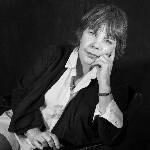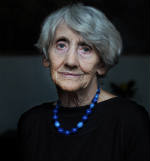The many men, so beautiful!
And they all dead did lie:
And a thousand thousand slimy things
Lived on; and so did I.
Coleridge
I
The fittest rubs gel on his hands as if he was polishing a trophy;
from the pharmacies the masks have been snatched
that protect against fear;
in the supermarket the shelves return a ghost of a smile,
no teeth, tongue or lips.
We keep our distance, two infinite meters apart,
on the avenue faraway echoes
of a passer-by rebound,
some extinct bird can be heard,
there are no corpses rotting in the sun
nor improvised pyre on the sidewalks or in the parks
(in the Ice Palace there are no skaters but it’s full to bursting),
a well guarded silence watches over us.
—Who’s last? – asks the youth of the staggered line.
No one answers. No one speaks
though it’s not forbidden.
We all raise in prayer our hands covered with latex
and protect our feeble face coverings.
The young man laughs and shows his innocent teeth,
he is wearing neither gloves nor mask,
the future is his.
He still doesn’t know that death travels in words.
A well guarded silence watches over us.
II
The woman smiles and her eyes are almost two slits,
the man receives the bowl of soup:
is it their fault that the world runs so fast
and airplanes, trains, highways fall over the edge?
III
The sky shows through the bare trunks,
the streets are pathways exclusive to the wind
that plays with the Cuatro Torres
as if they were made of paper
—maybe in the end they are—
and the immensity that dwells in the palaces
resembles a jester without a court in the empty city.
IV
And to think it’s not even a cell,
and to think that the old woman prepared the same soup as five hundred years ago
and he ate it with a hunger for food and memory.
V
The rider lies on the ground,
a meager stone
or maybe
a whim of the scorched earth.
A tiny mixture of protein and RNA
is emptying the world and returning us to a past without tourism,
of statues relaxing their poses
—a well deserved rest after so many centuries—
or paintings viewing themselves;
it shatters routines or commitments, well, the fate
of people who hours earlier…
I mistook myself in a tower of words
—I, thou, she, it, we, you, they—
for the word man.
The tower is leaning,
maybe it will fall, hopefully it will fall,
I, she, imprecise, he, imprecise,
it, imprecise, the living thing,
defenseless but with a future,
I am the failure of humanity,
but also its last trump card
like the dying guest for the virus,
the unyielding solitude
half way between the beast and the Bastille.
VI
The convoys advance through the doubly deserted streets
at dawns when the cock doesn’t crow.
They move slowly, there’s no hurry,
their passengers are not going anywhere
and for a long time no one has been expecting them.
There are no flowers or hymns or processions.
VII
The hero’s greatest feat is to be a man:
Ulysses had to visit the dead,
cry together with his deceased mother
and suffer the eternal spite of Ajax
in order to get home;
Gilgamesh in the end knows that his life
was no more than a breath before the magnificent walls
and his long journey in search of immortality
has returned him to Uruk empty-handed;
even Aquiles’ anger abates
and he returns Hector’s body to his father.
The hero’s destiny is to be a man,
but ours
is to occupy for a brief moment his place
and recite the exploits of Ulysses, for example,
as if reading an autobiography.
VIII
Besides the extinct birds
and the applause at 8 in the evening
(applause or blows?)
the ambulance sirens are the other voice of silence.
They cross empty streets, infernal oceans,
night and day one long night
of a blackness scarcely broken by a pallid glow:
how deep is the abyss
looking out of the window,
the music hypnotizes the strong and the weak alike.
Heroes don’t survive to the end of the day:
we weren’t talking about the Odyssey,
beeswax did not silence death
nor did the rope tie life and will to the mast.
Masks, white and green gowns, gloves
with deflated fingers,
lungs infected with cursed water,
heads of hair mistaken for seaweed
and teeth like fish bones polished by hunger
float on the dark current
that comes and goes in the sky without windows.
IX
I want to go to the city center as a ghost
not any ghost,
not the wretched shadow of myself,
maybe the deaf ghost of Hamlet or the witches of Macbeth
or the eleven souls that recite Despair and die, Despair and die
together with the exhumed or never found,
the winners or fallen of all Spain
in a war where hate is still served in bars with tapas and the good Rioja.
A specter who dispossesses the sky stabs the eyes, poisons the ear, turns to ash what he touches,
and with his horse’s hooves erases the faint line,
white chalk on dust,
between the living and the dead.
I want to go to the city center, forbidden until summer.
The planet leaned around the sun,
the long night drags the train of her dress over the north
—black bride of short days.
The ambulances and the autumn returned;
endless processions of taxis without passengers:
FREE sounds like a curse;
FOR SALE, FOR RENT, CLOSED UNTIL FURTHER NOTICE once upon a time shops;
black vans,
not carriages with wreaths and bows, no false gold or false silver
on these vans;
rotting leaves, masks and gloves without fingers dirty the sidewalks,
anyone can be the death of the other;
we cross the street, holding our breath,
we mutter prayers with faith or shame.
Only the ghosts tread warily in the puddles and don’t slip,
they talk louder than the sirens,
fear left them together with their flesh.
I want to go to the forbidden city center as a ghost,
not a cowardly shadow of myself that only dies for me.
X
At evening blue eyes peep in the grey vault:
will they be the eyes of some saint who being so long a man became God?
Will they be the eyes of the sage Oedipus who guessed the Sphinx’s secret
but not his mother
and was condemned to blind clairvoyance?
To what ghost do they belong, the eyes that pierce the sky
and watch over us like erratic drops of hope?
At nightfall the moon fills the holes,
some flanks are mottled with black smiles:
each one absolves us of living.



